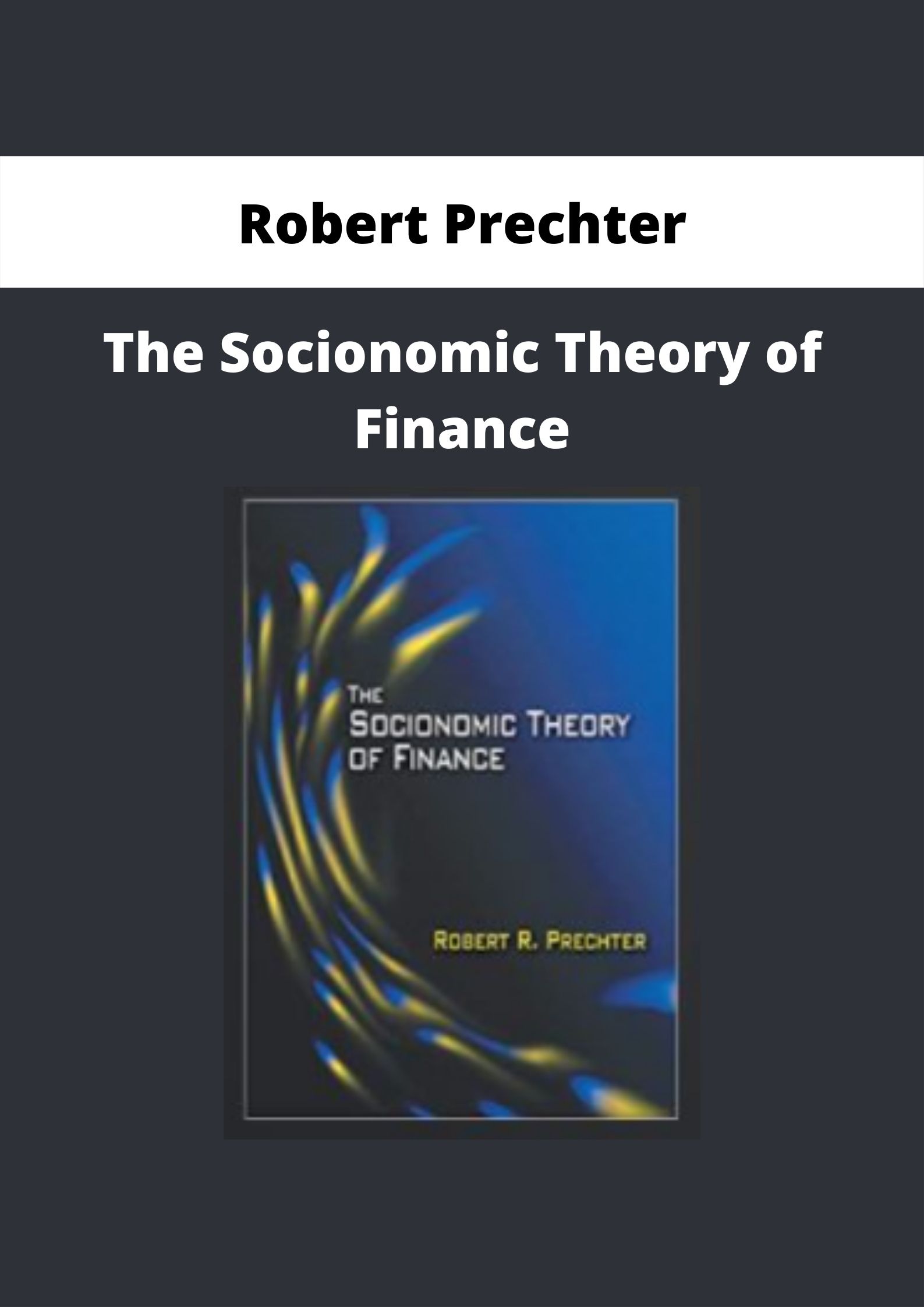Robert Prechter – The Socionomic Theory of Finance
$39 Original price was: $39.$20Current price is: $20.
Shopping Instructions:
- DISCOUNT 15% : SHOP15
- Product Delivery: Within 1 – 12 hours after purchase.
Robert Prechter – The Socionomic Theory of Finance
Sale Page : -/-
Description:
In this video, recorded at the 2014 International Federation of Technical Analysts Conference in London, Robert Prechter presents his most comprehensive and concise presentation of socionomics thus far.
Prechter challenges you to consider a radical new perspective on social and financial causality. The perspective will enable you to anticipate, understand and act on developing social trends that nearly all other investors and forecasters fail to see coming.
- Format: DVD or Streaming | 53 minutes + 17-minute bonus feature
- Presented By: Robert Prechter
- Level: Intermediate
DISCOVER A NEW PERSPECTIVE ON WHAT MOVES FINANCIAL MARKETS
Position yourself front and center of a record-setting audience. You’ll be at the 2014 International Federation of Technical Analysts Conference in London. In just 53 rapid-fire minutes, you will learn:
- A new way to think about cause and effect in finance, economics and history;
- To toss away myths about the markets; and
- Why it is critical to your finances and your overall wellbeing to do so
From the comfort of your favorite chair, watch Robert Prechter show how the field of finance differs radically from that of economics.
Prechter’s Socionomic Theory of Finance (STF) turns conventional wisdom about social behavior on its head. STF offers a better view: One that is more robust, more elegant, more logical, more defensible, and more useful.
First, Bob shows you a new perspective–a perspective that allows you to anticipate, understand and act on developing social trends that nearly all other investors and social forecasters fail to see coming.
Then, Prechter gives you numerous examples of how real world data are inconsistent with the Efficient Market Hypothesis’s claim that social events regulate financial markets. You will observe example after example–from interest rates to so-called oil shocks to elections to inflation to peace and war–that show how these factors consistently fail to produce price moves in the stock market.
You will learn how most investors’ conventional understanding is not only flawed, but also dangerous, as it influences them to make the worst possible decisions at the worst possible times–such as buying real estate in 2007, gold in 2011 and oil in 2014. These were major ‘turning-point’ years where it literally paid to go against the herd. Yet a small minority of investors were able to anticipate these “surprise” trend changes in time to take advantage of them. Now you can too.
STF posits that waves of social mood, not events and external conditions, determine trends in stock prices. Prechter offers a fresh perspective on how social changes occur throughout the world, from popular culture to geopolitics to, yes, stock prices, which are actually all results, not causes, of trends in social mood. As a result, you too will be equipped to spot these trends as Prechter does, separate yourself from the herd and prepare your family, your portfolio and your business to sidestep significant risks and capitalize on significant opportunities.
BONUS: PRECHTER’S “FINANCIAL-ECONOMIC CONTINUUM” PRESENTATION AT THE 2015 SOCIAL MOOD CONFERENCE
As a special gift to people who order this product, Prechter has included his 17-minute presentation, “The Financial-Economic Continuum,” delivered to the standing-room-only audience at the 5th Annual Social Mood Conference in April 2015.
In this high-quality video presentation, Prechter reviews the differences among purely speculative markets and purely utilitarian markets and then explores a full spectrum of markets that fall in between. Follow along as Prechter delineates the differences in markets for shelter versus real estate, food versus commodities clothing versus fashion and more. “The Financial-Economic Continuum” is an illuminating and entertaining presentation from the pioneer of the revolutionary school of financial thought known as socionomics.
Bond -Stock Trading course: Learn about Bond -Stock Trading
Bond trading definition
Bond trading is one way of making profit from fluctuations in the value of corporate or government bonds.
Many view it as an essential part of a diversified trading portfolio, alongside stocks and cash.
A bond is a financial instrument that works by allowing individuals to loan cash to institutions such as governments or companies.
The institution will pay a defined interest rate on the investment for the duration of the bond, and then give the original sum back at the end of the loan’s term.
A stock trader or equity trader or share trader is a person or company involved in trading equity securities.
Stock traders may be an agent, hedger, arbitrageur, speculator, stockbroker.
Such equity trading in large publicly traded companies may be through a stock exchange.
Stock shares in smaller public companies may be bought and sold in over-the-counter (OTC) markets.
Stock traders can trade on their own account, called proprietary trading, or through an agent authorized to buy and sell on the owner’s behalf.
Trading through an agent is usually through a stockbroker. Agents are paid a commission for performing the trade.
Major stock exchanges have market makers who help limit price variation (volatility) by buying and selling a particular company’s shares on their own behalf and also on behalf of other clients.
Please kindly contact us if you need proof of item.
1 review for Robert Prechter – The Socionomic Theory of Finance
Add a review Cancel reply
Related products
Other Courses
Other Courses
Other Courses
Other Courses
Other Courses
Other Courses












Oswald Koelpin –
Attentive seller, good deal, thanks! | Robert Prechter – The Socionomic Theory of Finance